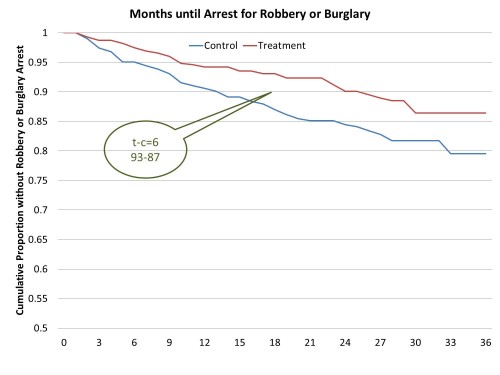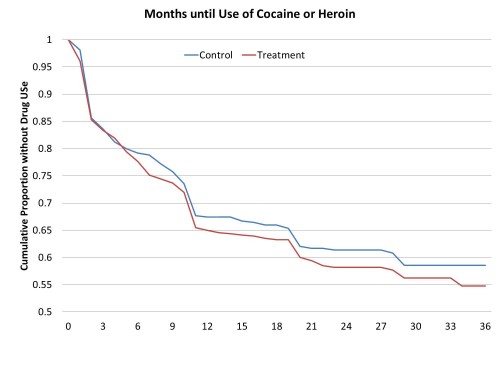In the wake of Philip Seymour Hoffman’s sad death, many are calling for various “harm reduction” approaches to substance use. Proponents of harm reduction have identified lots of ways to reduce the social and personal costs of drugs, but they often require us to shift our focus from the prevention of drug use itself to the prevention of harm. Resistance to such approaches often hinges on the notion that they somehow tolerate, facilitate, or even subsidize risky behavior.
This tension emerged clearly in my new article with Sarah Shannon in Social Problems. We re-analyzed an experimental jobs program that randomly assigned a basic low-wage work opportunity to long-term unemployed people as they left drug treatment. In some ways, the program worked beautifully. The job treatment group had significantly less crime and recidivism, especially for predatory economic crimes like robberies and burglaries. After 18 months, about 13 percent of the control group had been arrested for a new robbery or burglary, relative to only 7 percent of the treatment group. Put differently, 87 percent of those not offered the jobs survived a year and a half without such an arrest, relative to 93 percent of the treatment group who were offered jobs.
A randomized experiment that shows a 46 percent reduction in serious crime is a pretty big deal to criminologists, but the program has still been considered a failure. In part, this is because the “treatment” group who got the jobs relapsed to cocaine and heroin use at about the same rate as the control group. After 18 months, about 66 percent of the control group had not yet relapsed, relative to about 63 percent in the treatment group. So, there’s no evidence the program helped people avoid cocaine and heroin.
From an abstinence-only perspective, such programs look like failures. Nevertheless, even a crummy job and a few dollars clearly helped people avoid recidivism and improved the public safety of their communities. So, did the program work? From a harm reduction perspective, a jobs program for drug users surely “works” if it reduces crime and other harms, even if it doesn’t dent rates of cocaine or heroin use.
Chris Uggen is a professor of sociology at the University of Minnesota and the author of Locked Out: Felon Disenfranchisement and American Democracy, with Jeff Manza. You can follow him at his blog and on twitter. This post originally appeared at Public Criminology.



Comments 15
Bill R — February 16, 2014
This represents a functional fixation on labels, which can have detrimental effects.
From one perspective the labels "success" and "failure" can be ambiguous or even misleading when applied to various treatments. If I have a goal to lose 40 pounds and maintain my new weight for a year, did the diet that got me 30 pounds down fail?
But when success and failure are used to make funding decisions among alternative treatments, the labels are often unhelpful. Most treatments have effects. The questions are what are the effects and how do they compare to the effects of alternative treatments in terms of their goals, economically, socially, etc.?
Andrew — February 16, 2014
I wish we could see what would happen if a second experimental post-treatment option had been introduced, that assigned the (appropriately qualified) long-term unemployed to a stable job with a living wage, rather than a "basic low-wage opportunity." Could more relapses be prevented by lowering the barriers to more desirable jobs imposed by a drug conviction, or would we find that patterns of addiction are genuinely impervious to employment type and pay grade?
Also, it's debatable whether a single post-treatment use of cocaine or heroin should automatically qualify as a relapse, given that some proportion of users will be capable of moderate or casual consumption of drugs without resuming the destructive cycles of addiction.
mimimur — February 16, 2014
Why are these things treated a mutually exclusive? Maybe harm reduction should be the primary focus in these cases, because it does bring a crucial improvement in these people's lives, but it's a short term solution, and the abuse itself is likely to kill them in the end, especially with drugs of this caliber. Why can't we have both harm reduction and abstinence and pevention programs?
Should drug treatment aim to end use or reduce harm? | Drug Policy Debate Radar — February 18, 2014
[…] Read more… […]
HailYU — February 20, 2014
there's no stopping this because even the police are using some drugs OMG!
Tesettur Giyim Trend | Should Drug Treatment Aim to End Use or Reduce Harm? — March 1, 2014
[…] post originally appeared on Sociological Images, a Pacific Standard partner […]
Should Drug Treatment Aim to End Use or Reduce Harm? - Pacific Standard: The Science of Society — March 25, 2014
[…] post originally appeared on Sociological Images, a Pacific Standard partner […]
Shanae Knox — January 28, 2021
Obviously, the priority of this treatment is to end the use of the drugs. Then after this, the second priority is to reduce its use. Moreover, they can visit at https://assignmentman.co.uk/ site to complete their tasks. Because these drugs are much dangerous for health and need to be controlled at every level. They have shared all the harmful effects of this in this post.
office.com/setup — March 5, 2021
A debt of gratitude is in order for offering such enlightening web journal to us. I should state you are an inconceivable essayist, I love the way that you depict the things. In the event that you need I any character advancement specialist than get in touch with us at.
Emmitt Harper — March 18, 2021
Hey, this page is relevant to the search query! The user has found the information they were looking for!”
https://www.fiverr.com/qadirtapra/do-5-niche-manual-themed-blog-commenting
mymarijuana — April 22, 2022
Obviously, the first priority should be of this treatment is to end the use of the drugs.
mymarijuanacard — April 22, 2022
,www.mymarijuanacards.com